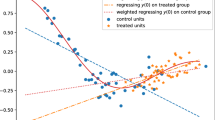Abstract
For causal inference, an important issue is to estimate the treatment effect from observational data where variables are confounded. The matching method is a classical algorithm for controlling the confounding bias via matching units with different treatments but similar variables. But traditional matching methods fail to do selection and differentiation among the pool of a large number of potential confounders, leading to possible underperformance in high dimensional settings. In this paper, we give a new theoretical analysis on confounder selection and differentiation, and propose a novel Differentiated Confounder Matching (DCM) algorithm for both individual and average treatment effect estimation by optimizing confounder weights and units matching. With extensive experiments on both synthetic and real-world datasets, we demonstrate that our DCM algorithm achieves significantly better performance than other matching methods on both individual and average treatment effect estimation.
Access this chapter
Tax calculation will be finalised at checkout
Purchases are for personal use only
Similar content being viewed by others
Notes
- 1.
The linearity assumption can be relaxed by including high order terms of \(\mathbf {X}\) inregression.
- 2.
High dimension brings NULL matching in DAME method, we compare our algorithm with other baselines in high dimensional continuous setting.
References
Austin, P.C.: An introduction to propensity score methods for reducing the effects of confounding in observational studies. Multivar. Behav. Res. 46(3), 399–424 (2011)
Bottou, L., et al.: Counterfactual reasoning and learning systems: the example of computational advertising. J. Mach. Learn. Res. 14(1), 3207–3260 (2013)
Chan, D., Ge, R., Gershony, O., Hesterberg, T., Lambert, D.: Evaluating online ad campaigns in a pipeline: causal models at scale. In: KDD, pp. 7–16 (2010)
Dehejia, R.H., Wahba, S.: Causal effects in nonexperimental studies: reevaluating the evaluation of training programs. J. Am. Stat. Assoc. 94(448), 1053–1062 (1999)
Diamond, A., Sekhon, J.S.: Genetic matching for estimating causal effects: a general multivariate matching method for achieving balance in observational studies. Rev. Econ. Stat. 95(3), 932–945 (2013)
Holland, P.W.: Statistics and causal inference. J. Am. Stat. Assoc. 81(396), 945–960 (1986)
Iacus, S.M., King, G., Porro, G.: Causal inference without balance checking: coarsened exact matching. Polit. Anal. 20(1), 1–24 (2012)
Imbens, G.W., Rubin, D.B.: Causal Inference in Statistics, Social, and Biomedical Sciences. Cambridge University Press, Cambridge (2015)
Kohavi, R., Longbotham, R.: Unexpected results in online controlled experiments. ACM SIGKDD Explor. Newsl. 12(2), 31–35 (2011)
Kuang, K., Cui, P., Li, B., Jiang, M., Yang, S.: Estimating treatment effect in the wild via differentiated confounder balancing. In: Proceedings of the 23rd ACM SIGKDD International Conference on Knowledge Discovery and Data Mining, pp. 265–274. ACM (2017)
LaLonde, R.J.: Evaluating the econometric evaluations of training programs with experimental data. Am. Econ. Rev. 604–620 (1986)
Lewis, R.A., Reiley, D.: Does retail advertising work? Measuring the effects of advertising on sales via a controlled experiment on yahoo! Measuring the Effects of Advertising on Sales Via a Controlled Experiment on Yahoo (2008)
Liu, Y., Dieng, A., Roy, S., Rudin, C., Volfovsky, A.: Interpretable almost matching exactly for causal inference. AISTATS (2019)
Rosenbaum, P.R.: Imposing minimax and quantile constraints on optimal matching in observational studies. J. Comput. Graph. Stat. 26(1), 66–78 (2017)
Rosenbaum, P.R., Rubin, D.B.: The central role of the propensity score in observational studies for causal effects. Biometrika 70(1), 41–55 (1983)
Acknowledgement
This work was supported in part by Zhejiang Province Natural Science Foundation (No. LQ21F020020), National Key Research and Development Program of China (No. 2018AAA0101900), National Natural Science Foundation of China (No. 62006207), and the Fundamental Research Funds for the Central Universities.
Author information
Authors and Affiliations
Editor information
Editors and Affiliations
Rights and permissions
Copyright information
© 2021 Springer Nature Switzerland AG
About this paper
Cite this paper
Ziyu, Z., Kuang, K., Wu, F. (2021). Estimating Treatment Effect via Differentiated Confounder Matching. In: Fang, L., Chen, Y., Zhai, G., Wang, J., Wang, R., Dong, W. (eds) Artificial Intelligence. CICAI 2021. Lecture Notes in Computer Science(), vol 13069. Springer, Cham. https://doi.org/10.1007/978-3-030-93046-2_58
Download citation
DOI: https://doi.org/10.1007/978-3-030-93046-2_58
Published:
Publisher Name: Springer, Cham
Print ISBN: 978-3-030-93045-5
Online ISBN: 978-3-030-93046-2
eBook Packages: Computer ScienceComputer Science (R0)




